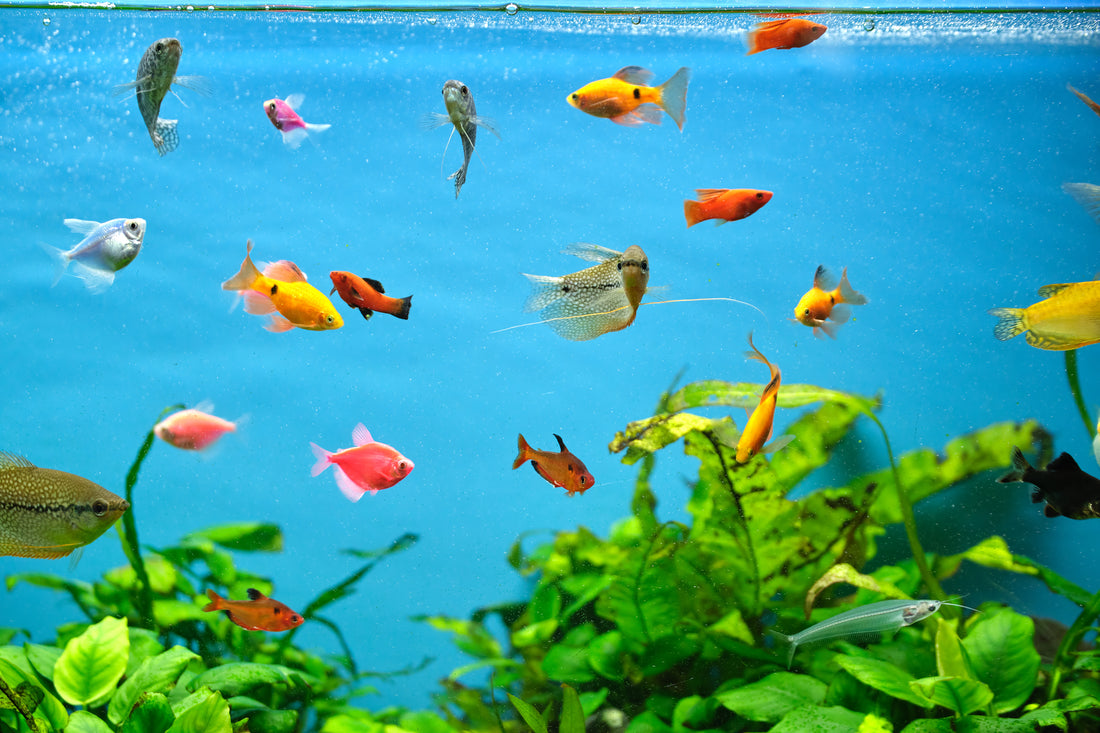
When’s the Best Time to Feed Fish?
As a new fish owner, there must be a lot of doubts and questions popping into your head. How often should you feed your fish? When and how much should they be fed or what’s the best time to feed fish? The most common error made by new fish owners is overfeeding. They might feel that their fish aren’t getting enough food or are hungry all the time. The owners assume "the fish is begging for more food" when it comes to the surface after seeing the owner come close to the aquarium.
However, the leftovers from overfeeding fish might block your filter and decompose into poisons that might prove hazardous to fish. Hence, one would often find the packaging label of fish foods advising, or rather warning people not to overfeed their fish.
Fish eat whenever there is food available and they are hungry. They will eat numerous times a day if food sources are adequate. However, if food sources are limited, they may skip meals for days at a time. Fish are extremely opportunistic and will eat at any given opportunity.
That implies that even if they aren't hungry, they will typically eat anything you put in front of them. The next time your fish "begs" for food, keep that in mind. Even if they are not starving, fish will readily accept food when offered to them since they soon figure out who brings it to the tank.
How often should you feed your fish?
What’s the best time to feed fish? It usually depends on the type of fish. In general, most fish can survive on one feeding per day. Some owners, however, favour feeding their fish twice daily. Fish that are young and growing may require three meals or more each day. The most important thing is to make each feeding very small, regardless of how many there are.
The majority of fish can survive on two meals a day. Except for nocturnal feeders, the timing is not crucial. Make sure to feed your nocturnal fish in your tank, such as certain catfish, right before you turn out the lights at night. They will forage in the dark, relying on their sharp noses to locate the food.
The once-per-day feeding guideline has a few exceptions. Silver dollars, mollies, and farlowellas are examples of herbivorous (vegetarian) fish, and they require regular feedings due to their smaller stomachs, which are unable to hold large amounts of food. They would graze on vegetation all day in the wild. They should be given several tiny meals a day or live plants to munch on. Because goldfish lack any sort of stomach, they shouldn't be given a big meal all at once. It is preferable to feed them multiple short meals throughout the day rather than one large meal just once per day because they naturally graze on algae and other foods throughout the day.
Young fish that have just hatched and are still developing require more frequent feedings of specialised meals.
Choosing the Correct Amount of Food
The general rule is to feed your fish. Give your fish no more food than they can eat in less than five minutes; underfeed if you're unsure. If they need another tiny meal, you can always do so.
Remember that the type of food you eat is just as important as its quantity. Make sure your fish are receiving the nutrition they require to remain healthy. Additionally, if you have a community of fish, you'll need to balance out the dietary requirements of each species by finding food.
The amount of food also depends on the time at which you are feeding the fish. The best time to feed fish is either morning or at night.
Here’s what overfeeding your fish can do:
The consequences of overfeeding fish might not be immediately noticeable. You don't need to worry about fish exploding from overeating because that is a myth. However, overfeeding can make fish prone to other health risks.
Some fish species may be susceptible to fatty liver disease. The health of your fish will be impacted by the negative effects on the aquatic environment and overfeeding, which can both stress fish.
Ammonia, nitrite, and nitrate are byproducts of uneaten food that can kill fish. If you overfeed, immediately remove the uneaten food with a net. You run the danger of changing the chemistry of the aquarium water if you don't remove the extra food. Oxygen and pH levels can drop to dangerously low levels, nitrite and ammonia concentrations can increase, and so on. The by-products can also cause the water to become cloudy, induce an algal bloom, or promote the uncontrolled growth of mould or planaria.
Aquarium water becomes foggy or cloudy and smells bad. On the surface, there can be foam or froth.
While there is no best time to feed fish, however, giving proper food and maintaining a regular feeding schedule will promote development, illness resistance, vibrant colours, and long, healthy lives for your fish.
Summary
Being a first-time fish owner can seem pretty daunting, especially with the internet just filled with information and detailed guidelines about feeding fish. However, all you have to do is just relax and don’t forget the golden rule- Don’t overfeed. It’s okay to underfeed your fish but not the opposite. At Intan, we are here to provide you with premium fish feed. Our feed is tailored to meet the specific needs of each species. We truly believe every feed can spark positive change and create a future promoting quality, resilience, and well-being. We aim to serve the needs of hobbyists and breeders for the best quality of each species' unique requirements. To know more about us, check out our Instagram page.
